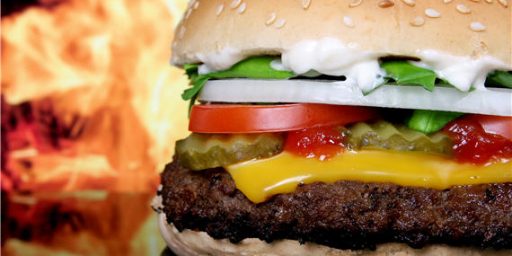You Are What You Eat
Radley Balko has a short piece in the current TIME arguing against government intervention in the “obesity crisis.” The upshot:*
Whodda’ thunk that twenty or ten or even five years ago that a major news magazine could pose a question like “are you responsible for your own weight” and not only would there be actual debate on the question, but the “no” side would start the debate with the upper hand?
It’s crazy. If you aren’t responsible for what you put into your mouth, chew and swallow, what’s left that you are you responsible for?
Indeed.
The counter-argument, which is given radically more space in the magazine, is that people are helpless against the dastardly food pushers:
Each year kids see more than 10,000 food ads on TV alone, almost all for items like soft drinks, fast foods and sugared cereals. In the same year that the government spent $2 million on its main nutrition-education program, McDonald’s spent $500 million on its We Love to See You Smile campaign.
The time-honored solution to this problem was for parents to say No.
Why quarrel with the personal-responsibility argument?
First, it’s wrong. The prevalence of obesity increases year after year. Were people less responsible in 2002 than in 2001? Obesity is a global problem. Is irresponsibility an epidemic around the world?
Actually, obesity is pretty rare in the world; as a widespread phenomenon, it’s relegated to a handful of incredibly wealthy push-button societies. Further, if something is increasing and the level of counter-vailing government activity has remained constant–or, indeed, gone up appreciably–then government activity is not the interesting variable. Correlation doesn’t translate into causality, but it is a requirement.
Second, it ignores biology. Humans are hardwired, as a survival strategy, to like foods high in sugar, fat and calories.
Which is interesting, considering that such foods were virtually non-existent throughout most of human history. Neanderthal man did not have Krispy Kreme, if I recall my history correctly. Empirically, we’re also hard-wired to prefer sitting around playing video games in preference to vigorous (non-sexual) physical activity. So what? A surprising number of people overcome their natural urges and make healthier choices.
Third, the argument is not helpful. Imploring people to eat better and exercise more has been the default approach to obesity for years. That is a failed experiment.
It works every time it’s tried.
Fourth, personal responsibility is a trap. The argument is startlingly similar to the tobacco industry’s efforts to stave off legislative and regulatory interventions. The nation tolerated personal-responsibility arguments from Big Tobacco for decades, with disastrous results.
The results are only “disastrous” if one lives in a welfare state. Otherwise, the consequences of smoking and other limited externality behaviors fall entirely on those who make the choice to risk adverse consequences down the line in trade for years of pleasure in the short term.
This debate is a classic example of what Julian Sanchez has termed reductio creep:
Reductio creep is the process by which an insane extension of some principle, offered as a reductio ad absurdum of that principle, is soon afterwards realized.
My dad, until a decade or so ago a two-pack-a-day smoker, railed for years against government attempts to limit smoking in public places, arguing that, once they succeeded in taking away smokers’ freedoms, they’d go after unhealthy food, since the logic was essentially the same. I was skeptical. But here we are.
*All quotes are from Radley’s post, linked above. He duplicates two TIME articles, including his own, that are otherwise available only to subscribers.






It is true that we are hard-wired for salt and sweet (very high energy foods). Animals will travel a hundred miles for a salt lick and I have never met an animal, wild or domesticated, that did not like honey (except cats; very odd, that). Most concentrated energy sources require *effort* (or pain – bee stings) to obtain so we needed to have a reason to do so.
Nonetheless, we are more than our instincts. We, as educated people, alone bear responsibility for what we eat.
Don’t forget that as part of our “education” about eating is government programs that actually push corn-based products upon us. Why? Not because we need them, but because the most powerful agribusiness lobbies deal with the production of corn. The whole food pyramid from the get-go has been a joke, bought and paid for by argibusiness. I’m no lefty, but our dietary recommendations — founded on information from lobbyists instead of nutritionists — are a complete perversion of what the body needs.
Meezer: Agreed on the predilection for such foods. I was reacting to “sugar” in the sense of processed sugar and the other things in the post-World War II diet that, because of their sudden abundance, have helped create the problem.
MBB: True as well, althouhg the four food groups model has been outmoded for a while now. I’m sure agribusiness is part of the problem but think undeveloped science is the main culprit. We were so focused on the effects of high fat and cholesterol that we missed the carbs issue. Plus, they were thinking whole grains, not doughnuts and pizza.
The modern version of the “food groups” model is the pyramid–but being taught the basics in grade school doesn’t relieve us of the responsibility to stay abreast of current developments in nutrition.
I’m not so sure we’re having cornbread pushed down our throats–corn *syrup*, maybe, but that’s by the soft-drink people, not the nutritionists. It’s been pretty clear since the 1970s that refined flour, rice, and sugar are not as good as whole wheat, brown rice, and fresh (or small amounts of dried) fruit–there’s no mystery here.
Well, I wouldn’t say the soft-drink companies force us to drink corn syrup — going back to that personal responsibility thing.
I don’t understand how anyone can stand to drink pop (ahem) that is sweetened with that stuff. At the time the naturally sweetened soft drinks switched, the only pop I was drinking was artificially sweetened — and ever since then the aftertaste I get from the corn sweeteners is repulsive to me.